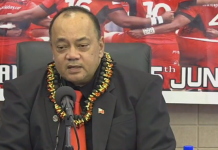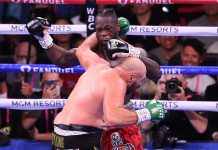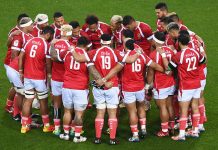Israel Folau, arguably one of the greatest footballers ever to play in Australia, has been embroiled in a storm of controversy ever since he posted statements online saying that homosexuals were going to hell unless they repented.
Folau’s stance has led to his disciplining by the Australian rugby authorities and the apparent end of his career in that country. He has also been attacked by secular commentators for his views.
However, there has been little attempt to put Folau’s words into context, or to examine the doctrinal issues behind his statements or what church leaders and their followers are actually saying about the issue.
Folau posted a message on Instagram in which he said that “drunks, homosexuals, adulterers, liars and fornicators” would go to hell unless they repented.
“Those that are living in sin will end up in hell unless you repent. Jesus Christ loves you and is giving you time to turn away from your sin and come to him,” he said.
Supporters
A number of Folau’s fellow Islander football player have supported his stance.
Radio New Zealand reported that England number eight Billy Vunipola and Queensland Reds captain Samu Kerevi were among several Pasifika athletes to “like” Folau’s original post on Instagram.
It said many other players may share similar views.
Family and friends defended Folau, saying the only thing that mattered to him was how he would be viewed by God and saying his religious views came from “a place of love, not hate.â€
A petition named ‘#istandwithIzzyFolau’ has gathered almost 10,000 signatures since it was posted on the change.org site, claiming Folau is the victim of discrimination.
“This is discrimination by the Rugby Union Australia against freedom of beliefs… against Christianity and someone’s religious beliefs,†the petition reads.
The ‘My Tongan – Online community’ has shared the petition with its 17,000-plus members.
Former rugby league player, retired boxer and devout Muslim Anthony Mundine defended Folau’s right to express his beliefs and said he was being persecuted because of his colour.
“People are missing the point here, it’s not about the Bible or the Biblical quote that Izzy put up, it’s a black man expressing it,” Mundine said.
“I commend Izzy for sticking up and facing such racism and being persecuted and not having the right to make a living … there’ve been guys out there been done for drugs, assaults … yet he (Folau) can’t express his mind?â€
Assemblies of God
Folau, who is of Tongan descent, was born a Mormon, but converted to the Assemblies of God, a pentecostal church which takes a literalist approach to scripture.
Folau’s comments reflect AOG doctrine.
In August 2014 the General Presbytery of the Assemblies of God in the United States issued a statement saying that homosexual behaviour was sinful because it disobeyed scriptural teachings.
The Presbytery based its ruling on Leviticus 18:22 and 20:13 which prohibit homosexual behaviour.
“Scripture consistently identifies homosexual behaviour as sin,†the Presbytery said.
“Not only do the Scriptures condemn more flagrant examples of homosexual violence and promiscuity, they also provide no support for the popular modern idea that loving and committed homosexual relationships between two long-term partners, even if legally married, are morally acceptable. Homosexual activities of every kind are contrary to the moral commandments God has given us.â€
However, despite this official stance, such beliefs are not universal within the church. Research by the US-based Pew Research Centre, found that about a third of AOG members surveyed in that country believed homosexuality should be accepted. The figure was highest for church members between 30-49 and women.
Catholic church
In New Zealand, the Catholic Church’s spokeswoman, Dame Lyndsay Freer, said Folau’s words were damaging to the Christian faith.
“I feel very sorry for what Israel Folau has done,†the Otago Daily Times quoted her as saying.
“(He is) . . . presenting God as a God of punishment and a God of vengeance, not a God of love, and mercy and compassion.
“It’s dangerous territory when you lump everyone together as sinners and damned because at the end of the day it’s God that makes that judgement, not us, and not Israel Folau.â€
The official position of the church is that homosexuality is “objectively disordered†and says that gay people “are called to chastity.†However, it also says that gay people “must be accepted with respect, compassion, and sensitivity. Every sign of unjust discrimination in their regard should be avoided.â€
Public perceptions of Catholic approaches to homosexuality have changed greatly under Pope Francis.
Last month Pope Francis said homosexual tendencies were “not a sin,†but added: “Tendencies are not sin. If you have a tendency to anger, it’s not a sin. Now, if you are angry and hurt people, the sin is there.â€
The Pope is famous for answering a question about homosexuality with the reply: “Who am I to judge?â€
However, some would argue that he has been careful to tread a fine line between expressing love and tolerance for the sinner, but rejecting what he sees as a sin.
It has been reported that he recently said that in a confidential meeting with Italian bishops, the Pope said that men with “deeply rooted†homosexual tendencies, or who “practice homosexual acts,†should not be allowed into the seminary.
At the meantime, however, the Catholic news service Crux reported that Juan Carlos Cruz, a Chilean survivor of clerical sexual abuse, said that during a private meeting with the Pope in April, Francis had said it did not matter that he was gay.
“Juan Carlos, that you are gay doesn’t matter,†Francis reportedly said.
“God made you like this and loves you like this and it doesn’t matter to me. The pope loves you like this, you have to be happy with who you are.â€
Methodist church
Homosexuality has been a divisive issue in some section of the Methodist church. In New Zealand the Methodist Church approved the ordination of openly gay and lesbian ministers in 2004. The church allows each local congregation to determine its own policy on the issue. In 2013, when same-sex marriage was legalized in New Zealand, congregations that opted to do so were able to perform same-sex marriages.
However, dispute over the issue led to the creation of a Wesleyan Methodist church and a Tongan Methodist church, the Vahefonua Tonga o Aoteoroa. In 2012 the Vahefonua Tonga opposed the same sex marriage bill on the ground that it went against Tongan traditions, cultural and religious beliefs.
Sexuality in the Pacific
Churches in the Pacific have been generally conservative on sexual issue. Tonga, for instance, remains the only Pacific island nation not to have signed the United Nations Convention on the Elimination of all forms of Discrimination against Women because certain church leaders believed it would mean that it will mean Tonga would be forced to legalise homosexuality and allow same sex marriage.
Homosexual, third gender and trans gender people have occurred historically and in contemporary Pacific culture.
In certain countries there are men such as the fa’afafine in Samoa who fulfil traditionally female roles. Fakaleiti in Tonga play a similar multi-gendered role and are famous for organising the Miss Galaxy Pageant in Tonga.
However, such people may not necessarily align with western concept of transgender or gay and lesbian identities.







